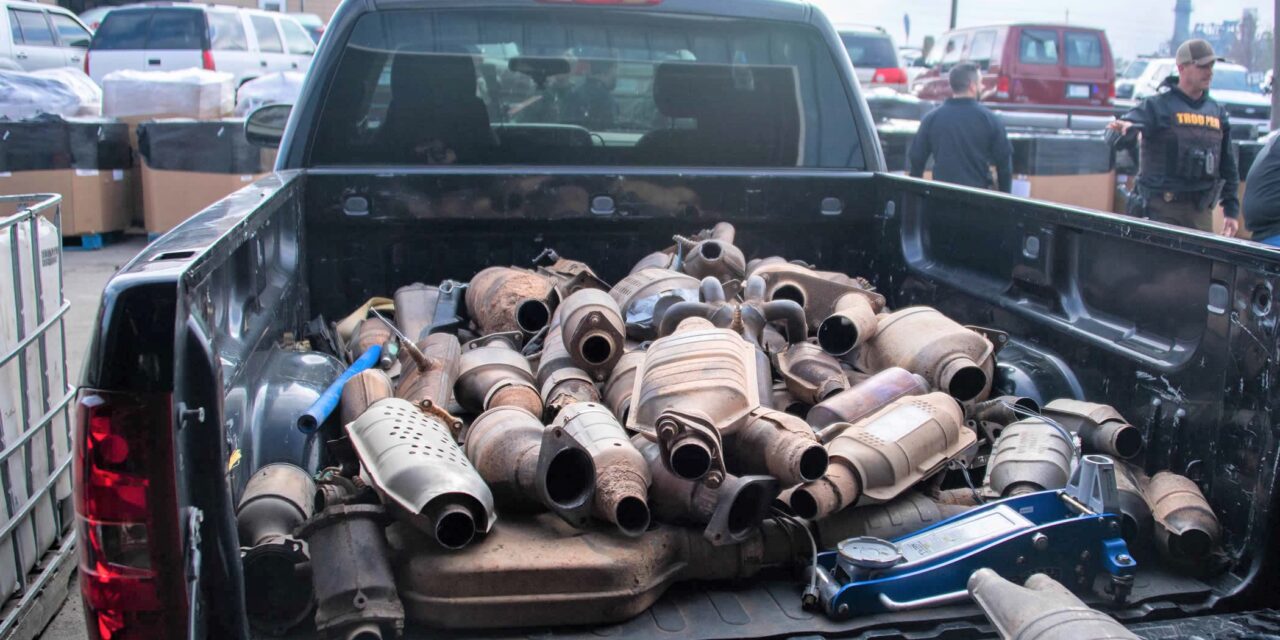
By SDCN Staff
A federal grand jury in the Eastern District of California Wednesday returned a 40-count indictment charging nine people with conspiracy to transport stolen catalytic converters, conspiracy to commit money laundering, and other related charges.
According to court documents, brothers Tou Sue Vang, 31, Andrew Vang, 27, and Monica Moua, 51, all of Sacramento, allegedly operated an unlicensed business from their personal residence in Sacramento where they bought stolen catalytic converters from local thieves and shipped them to DG Auto Parts LLC in New Jersey for processing. The Vang family allegedly sold approximately $38 million in stolen catalytic converters to DG Auto.
Navin Khanna, aka Lovin Khanna, 39; Tinu Khanna, aka Gagan Khanna, 35; Daniel Dolan, 44; Chi Mo, aka David Mo, 37; Wright Louis Mosley, 50; and Ishu Lakra, 24, all of New Jersey, operated DG Auto in multiple locations in New Jersey. They knowingly purchased stolen catalytic converters and extracted the precious metal powders to sell to a metal refinery. DG Auto sold the precious metal powders it processed from California and elsewhere to a metal refinery for over $545 million.
Other arrests, searches, and seizures also took place in Minnesota, New Jersey, New York, Nevada, North Carolina, Oklahoma, Virginia, and Wyoming. In total, 21 individuals in five states have been arrested and charged for their roles in the conspiracy.
Federal, state, and local law enforcement agencies from across the United States, including Homeland Security Investigations, executed a nationwide, coordinated takedown of leaders and associates of a national network of thieves, dealers, and processors for their roles in conspiracies involving stolen catalytic converters sold to a metal refinery for tens of millions of dollars.
“The success of this national takedown highlights the importance and necessity of dynamic law enforcement partnerships that we foster at DHS every single day,” said Deputy Secretary of the Department of Homeland Security John Tien. “This calculated, cooperative whole-of-government approach across multiple states illustrates our commitment to protecting the homeland from those who seek to profit from sophisticated schemes. HSI will continue to focus its efforts on keeping these types of criminal elements off our streets while dismantling the groups behind these and other thefts.”
Catalytic converters are components of an automotive vehicle’s exhaust system that reduce toxic gasses and pollutants from a vehicle’s internal combustion engine into safe emissions. Catalytic converters use precious metals in their center, or “core”, and are regularly targeted for theft due to the high value of these metals, especially palladium, platinum, and rhodium. Some of these precious metals are more valuable per ounce than gold and their value has increased in recent years. The black-market price for catalytic converters can be more than $1,000 each, depending on the type of vehicle. Additionally, catalytic converters often lack unique serial numbers, VIN information, or other distinctive identification features, making them difficult to trace to lawful owners. Thus, the theft of catalytic converters have become increasingly popular because of their value, relative ease to steal, and lack of identifying markings.
The process to remove the precious metals from the catalytic converters is complex and may release toxic gasses. Therefore, catalytic converters are typically sold intact to an extraction company. The extraction company will remove the core from the catalytic converter using a “de-canning” process that crushes the honeycomb structure (or brick) inside the core, resulting in precious metal powders. The process of de-canning crushes the brick inside the catalytic converters; new bricks are not available for sale to the public. The precious metal powders are then sold to a metal refinery for further processing.





